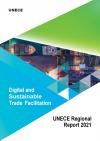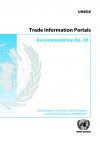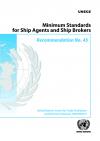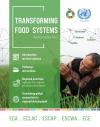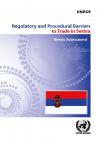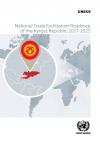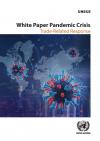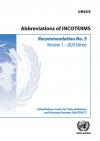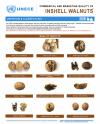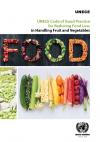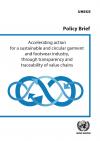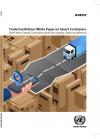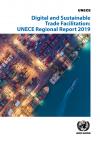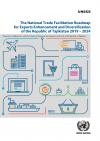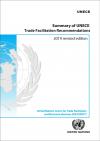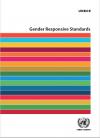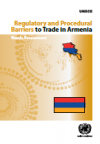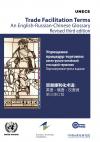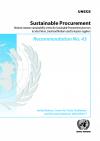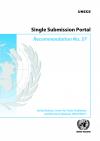Publications
Displaying Results 41 - 60 of 260
- English
The UNECE Regional Report 2021 on Digital and Sustainable Trade Facilitation has been produced based on the results of the United Nations Global Survey on Digital and Sustainable Trade Facilitation. The Global Survey (ECE/TRADE/467) is a joint initiative under the Joint United Nations Regional Commissions’ Approach,
- English
Transparency and predictability are essential elements for the cross-border movement of goods. In order to trade internationally efficiently and cost effectively, it is necessary to access all the regulatory requirements prior to the actual sale of merchandise. Having an official, single portal where all this information can be accessed provides the necessary transparency and predictability. Such
- English
This UN/CEFACT Recommendation 45 on Minimum Standards for Ship Agents and Ship Brokers (ECE/TRADE/462) is an update of the 1988 UNCTAD minimum standards for ship agents and a reflection of the changes in operational practices in the ship agency profession. It also recognizes, for the first time, the role of the ship broker in bringing the ship and cargo together. It aims to reconcile the effects
- English
The UN World Food Systems Summit (FSS) 2021 marks a milestone to promote actions that aim at overcoming challenges and delivering healthier, more sustainable, and inclusive food systems and to deliver progress globally across all the Sustainable Development Goals (SDGs). In that respect this report was prepared to provide harmonized pathways and game changers to overcome common and
- English
This study summarizes the key findings of the ninth study, which focuses on Serbia. It was carried out pursuant to the Government’s request to support ongoing efforts to increase the trade sector’s contribution to development and the implementation of the 2030 sustainable development goals (SDGs). The study was prepared by the UNECE secretariat in close consultation with public and private-sector
- English
The National Trade Facilitation Roadmap of the Kyrgyz Republic 2021-2025 serves as the guiding framework for comprehensive national trade facilitation reforms over a five-year period. The Roadmap sets out a strategic vision and respective goals and activities for the Kyrgyz Republic to implement. Through these activities the Kyrgyz Republic can transform its trade facilitation services to
- English
Introduction
In the future, the year 2020 will be remembered for the COVID-19 pandemic and its related consequences. This may lead to a new normal way of working; but in the meantime, such pandemics could lead to major disruptions in trade flows and damage the overall economic health of countries. There are measures which can be put into place to reduce this impact and allow
- English
Harmonization and partnership are key elements to ensure interoperability of international standards. The United Nations Economic Commission for Europe (UNECE) has worked with partner organizations to ensure that the guidance we provide on topics like international trade are harmonized with their work. One key success story is the partnership with the International Chamber of Commerce (ICC) which
- English
Inshell Walnuts Poster
The UNECE standard applies to inshell walnuts* free from outer husks, of varieties (cultivars) grown from Juglans regia L., intended for direct consumption or for food when intended to be mixed with other products for direct consumption without further processing. It does not apply to inshell walnuts that are processed by salting, sugaring, flavouring, roasting or for
- English
A Code of Good Practice which helps maintain quality along the fresh fruit and vegetables supply chains, to prevent and reduce food loss and waste. It sets out measures to be taken at the various stages of the supply chain before the fruit and vegetables reach the consumer, i.e. from harvest to retail and supports continued improvement, step by step. Real improvement, however, can only be
- English
The garment and footwear industry has one of the biggest environmental footprints and poses great risks for human health and society. At the same time, the complexity and opacity of the value chain makes it difficult to identify where such impacts occur and to devise necessary targeted actions. In the next decades, fast fashion trends, coupled with growing demand in emerging economies, are
- English
Technology is entering into every aspect of the supply chain and providing performant and innovative tools. As many are just starting to talk about the dematerialization of certain documents used in trade and transport, others are investigating how devices can communicate information directly to the rest of the supply chain without human intervention. Smart Containers are taking the digital
- English
It is fair to say that trade facilitation is a key policy priority for most if not all the trading nations. The benefits for implementing trade facilitation provisions such as the ones in the World Trade Organization’s (WTO) Trade Facilitation Agreement are well documented. However, the need for measuring progress of the provisions remain as strong as ever. Since 2015 the United Nations
- English
Trade facilitation is a key factor in national competitiveness and in the economic development of countries. At the same time, the development of a simplified and automated trade environment is a challenging reform programme for any country. It requires strategic vision, leadership, change management, collaboration, and coordination between various stakeholders. It is also a well-known fact
- English
Within the United Nations Economic Commission for Europe (UNECE), the United Nations Centre for Trade Facilitation and Electronic Business (UN/CEFACT) has developed a series of some 30 recommendations and standards that are used worldwide to simplify, standardize and harmonize trade procedures and information flows. Many of these are now international standards of the International
- English
Gender Responsive Standards publication (ECE/TRADE/445) makes the case for mainstreaming gender in the development and implementation of standards. The first chapter places the discussion in the larger perspective of how standards contribute to the achievement of the Sustainable Development Goals of Agenda 2030. It reviews the role of
- English
Since 2010, the UNECE has been undertaking demand-driven national studies of regulatory and procedural barriers to trade, with a view to: helping countries achieve greater regional and global economic integration; informing donors as to where assistance might be required; and, supporting policy discussions within the Steering Committee on Trade Capacity and Standards (previously, the
- English
This Glossary (ECE/TRADE/377/Rev.2) represents an English-Russian-Chinese dictionary of terms that are widely used in trade facilitation. This is the third, revised and completed edition including new terms in trade facilitation and electronic business. For the first time it incorporates a Chinese version of the terms, thus
- English
Public procurement alone represents 15-20% of the global GDP, while procurement commitments under the World Trade Organization’s Agreement on Public Procurement (GPA) have been estimated at around EUR 1.3 trillion. This is enormous purchasing power that can drive investment and innovation towards more sustainable production and consumption patterns, to address for instance, challenges linked
- English
Streamlining border crossing and helping traders to access international markets can provide significant stimulus to national economies and directly supports the implementation of UN Sustainable Development Goal (SDG) 17, specifically on promoting a universal, rules-based, open, non-discriminatory and equitable trading system in target 17.10. One of the key smart connectivity solutions a


